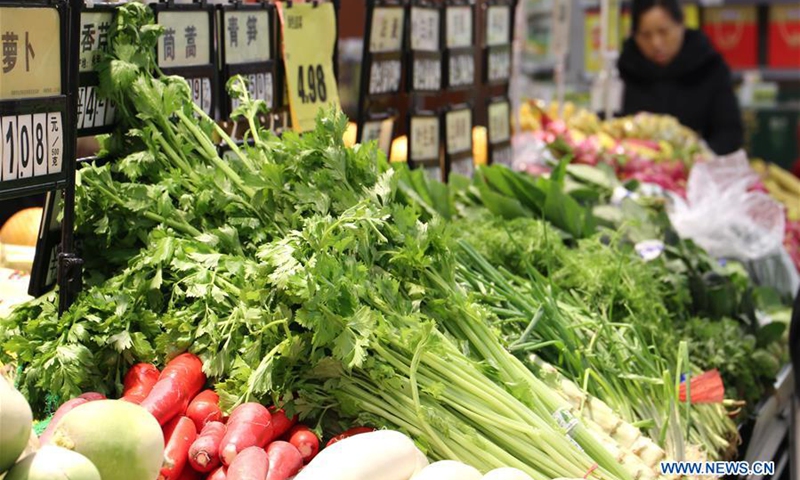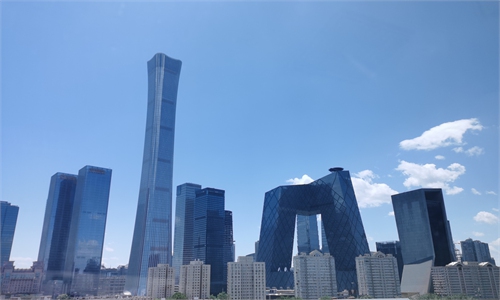
A citizen buys vegetables at a supermarket in Handan City, north China's Hebei Province, Jan. 9, 2020. (Photo: Xinhua)
China's consumer inflation moved back into positive territory in March, with a 0.4 percent gain year-on-year, while producer prices continued on an upward trend, official data showed on Friday, as the country's economic recovery sustains its positive momentum.
The country is on track for mild inflation, boding well for the rebound through the coming year, economists said.
The consumer price index (CPI), a main gauge of inflation, went up 0.4 percent in March from the prior year, ending a year-on-year decline for the first two months, according to figures unveiled by the National Bureau of Statistics (NBS).
The CPI's return to positive territory from a 0.2 percent fall year-on-year in February was due to a substantial tapering-off of the negative carryover effect, Dong Lijuan, a senior statistician with the NBS, explained in a statement posted on the bureau's website on Friday.
The effect that carries over from last year's price changes undercut the March reading by 0.6 percentage points, 1.2 percentage points less than in the previous month, per NBS estimates.
The core CPI, deducting food and energy prices, remained flat in the first quarter from the year before, the bureau revealed.
On a monthly basis, the CPI reading was down 0.5 percent in March from the previous month, reversing a 0.6 percent gain in February.
The monthly moderation was attributed to a seasonal drop in demand after the Spring Festival, according to Dong, citing a 3.6 percent fall in food prices in March from February which pulled the monthly reading down by about 0.71 percentage points. Notably, pork prices were down 10.9 percent over the past month.
The consumer inflation is expected to maintain a mild rise this year, as food prices, notably pork prices, experience moderation, Tian Yun, vice director of the Beijing Economic Operation Association, told the Global Times on Friday.
This makes the case for the country to keep the annual inflation rate well within 3 percent, he reckoned.
China set its consumer inflation target at 3 percent for this year, compared with the 3.5 percent target for 2020.
An estimated mild inflation would augur well for the overall economic rebound this year and the coming year, according to Tian.
Speaking at the 43rd meeting of the International Monetary and Financial Committee via video link, Yi Gang, governor of the People's Bank of China (PBC), the country's central bank, said the Chinese economy has maintained a steady recovery this year with the country's prudent monetary policy having effectively propped up the virus response and having been kept within a normal range, read a PBC statement on Friday.
Yi pledged to keep macroeconomic policy stability and continuity in the future.
Also noteworthy, the producer price index (PPI) kept an uptrend in both monthly and yearly terms.
The PPI rallied 4.4 percent in March year-on-year. This compares with an increase of 1.7 percent in February. The PPI scored a monthly gain of 1.6 percent last month.
Reflecting on the PPI upsurge on a yearly basis, Dong said that manufacturing material prices rose 5.8 percent in March, quickening by 3.5 percentage points from the month before, while prices of consumer goods also edged up 0.1 percent in March from a 0.2 percent drop in February.
Among the industries that saw bigger price increases were smelting and pressing of both ferrous and nonferrous metals, and chemical raw materials and chemical product manufacturing, the statement said.
An uptrend in producer prices is likely to sustain momentum in the second half, Tian said, noting, however, so long as oil prices are not to soar, the overall price level wouldn't be of concern.

